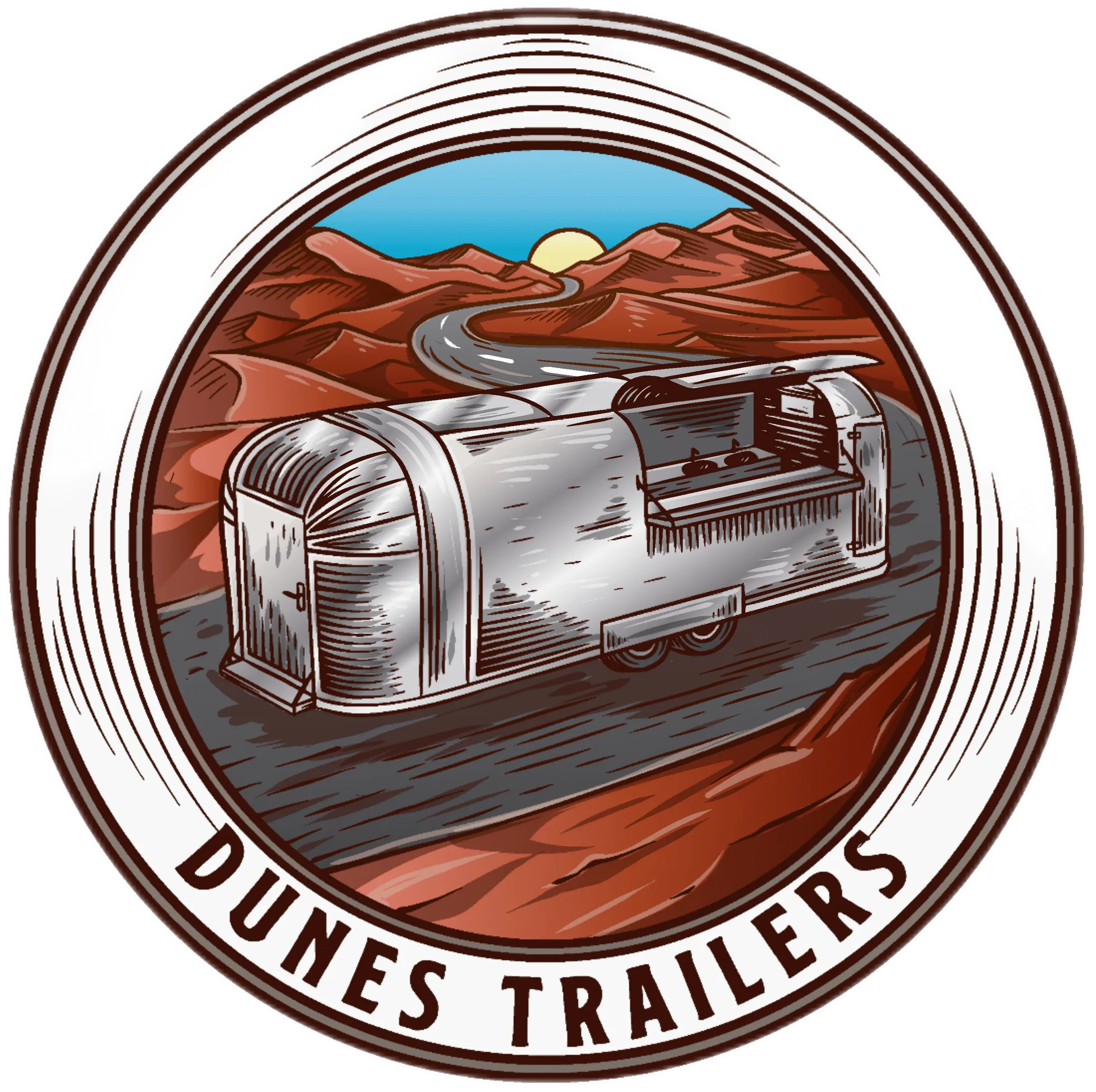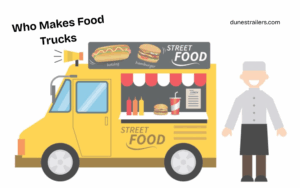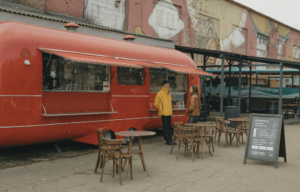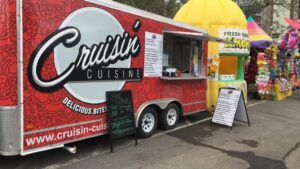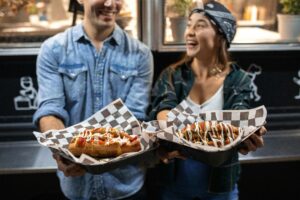How to Own a Food Truck? Starting a food truck business can take your meals to a wider audience at a lower cost than a traditional restaurant.
However, managing a food truck requires careful planning, market expertise, and effective financial management. From the initial idea to daily tasks, the text guides each step in detail.
1. Research and Planning
Understanding the Market
Before launching your food truck, it’s crucial to research your target market thoroughly.Identify the types of food that are popular in your area and consider what could set your food truck apart. Learn what food trucks offer, where they park, and how they attract customers.
In the UAE, food trucks serving gourmet fusion cuisine, modern Middle Eastern dishes, and specialty desserts are especially popular. International street food like tacos, sushi, and burgers also attract a strong following.
How to Own a Food Truck? Developing a Business Plan
A well-thought-out business plan is your roadmap to success. It should outline your food truck’s concept, target market, marketing strategies, and financial projections.
Key Elements of a Food Truck Business Plan:
- Concept: Define your truck’s unique selling proposition (USP). What type of food will you serve? What makes your truck different from others?
- Target Market: Identify your ideal customer. Are you targeting office workers during lunch hours, or are you aiming for late-night crowds at events?
- Budget: Outline your startup costs, including the truck, equipment, licenses, and initial inventory. Also, estimate ongoing expenses like fuel, maintenance, and food costs.
- Revenue Projections: Estimate how much you’ll need to sell to break even and achieve your profit goals.
2. Budget and Investment Planning
Initial Investment and Costs
Starting a food truck requires a significant initial investment, but it’s generally less expensive than opening a traditional restaurant. Here’s a breakdown of the typical costs involved:
1. Food Truck:
- New Truck: $75,000 – $150,000
- Used Truck: $50,000 – $100,000
- Renting Cost: $2,000 – $3,000 per month (option for those with limited capital)
2. Equipment and Customization:
- Kitchen Equipment (grills, fryers, refrigerators): $10,000 – $20,000
- Customization (branding, kitchen layout): $5,000 – $15,000
- Generator: $3,000 – $5,000
3. Licenses and Permits:
- Health Permit: $500 – $1,500
- Business License: $50 – $500
- Parking Permits: $300 – $1,000
- Fire Safety Permit: $100 – $500
4. Insurance:
- General Liability Insurance: $2,000 – $4,000 annually
- Commercial Auto Insurance: $1,200 – $2,500 annually
5. Initial Inventory and Supplies:
- Food Ingredients: $1,000 – $3,000
- Packaging Materials: $500 – $1,000
- Cleaning Supplies: $200 – $500
6. Marketing and Branding:
- Logo Design and Branding: $500 – $2,000
- Website and Social Media: $1,000 – $3,000
7. Miscellaneous Costs:
- Fuel: $300 – $500 per month
- Maintenance: $500 – $1,000 annually
Total Estimated Initial Investment: $50,000 – $200,000
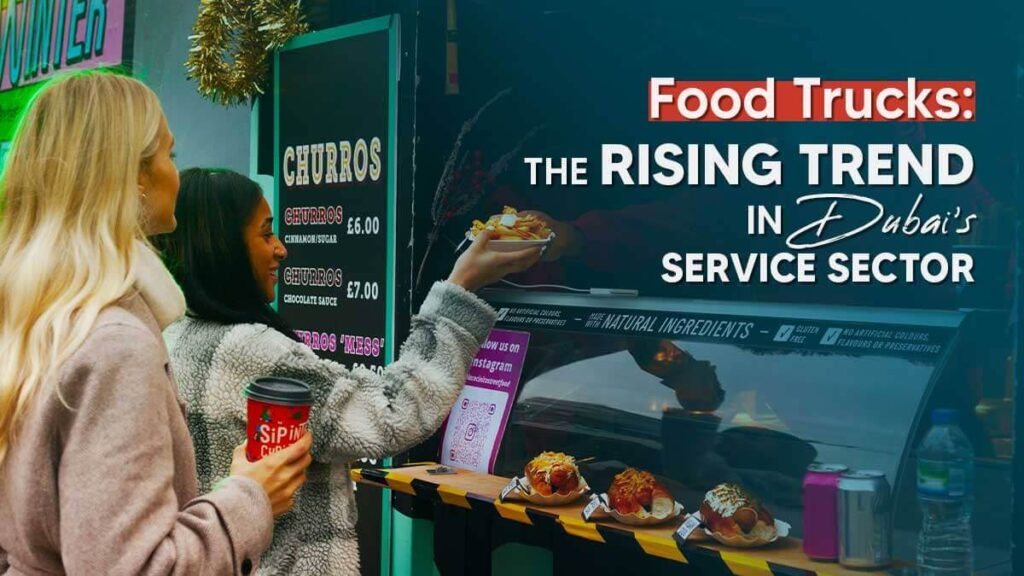
Financing Your Food Truck
If you don’t have enough capital to cover these costs, consider various financing options:
- Small Business Loans: Available through banks or credit unions, often requiring a solid business plan and good credit.
- Crowdfunding: Platforms like Kickstarter can help you raise funds from the community.
- Investors: Seek out investors who believe in your concept in exchange for a share of the profits.
- Rent out: Renting a food truck can reduce initial costs, allowing you to invest more in marketing or menu development.
Working with Food Truck Builders
How to Own a Food Truck? When purchasing a truck, it’s essential to work with reputable food truck builders who can customize the vehicle to meet your needs. Some well-known food truck builders in the industry include:
Dunes Trailers: Leading Food Truck Builder in the UAE
- Custom Design: Tailored food trucks designed for efficiency, durability, and standout appeal.
- Licensing Support: Assistance with securing necessary permits and regulatory compliance.
- Ready-to-Operate Trucks: Fully equipped trucks that meet local and international standards.
- After-Sales Maintenance: Ongoing maintenance services to keep your truck running smoothly.
- Consultation Services: Expert advice on menu planning, branding, and business setup.
Dunes Trailers offers a complete solution for launching a successful food truck in the UAE.
Food Truck Dubai:
Offers both new and used food trucks with customization options.
Apex Specialty Vehicles:
Known for building high-quality, durable food trucks tailored to specific culinary needs.
These companies can guide you through the customization process, ensuring your truck is functional, compliant with local regulations, and branded to stand out in the market.
3. Legal and Regulatory Requirements
Obtaining Licenses and Permits
Operating a food truck requires several licenses and permits, which vary by location. You’ll need to comply with both state and local regulations.
Common Permits and Licenses:
- Health Department Permit: Ensures your truck meets food safety standards. Inspections are usually required before and after you start operations.
- Business License: Required to legally operate your business within a city or county.
- Fire Safety Permit: Necessary to ensure your truck’s equipment, such as propane tanks, meets safety standards.
- Parking Permit: Many cities require permits to park and operate in specific areas. Some may even have designated spots for food trucks.
Insurance Coverage
Insurance is crucial to protect your investment. Consider the following types:
- General Liability Insurance: Covers accidents or injuries that occur on your truck.
- Commercial Auto Insurance: Protects your vehicle in case of an accident.
- Worker’s Compensation: If you have employees, this insurance covers injuries or illnesses related to their job.
4. Choosing and Customizing Your Food Truck
Buying vs. Leasing a Food Truck
Deciding whether to buy or lease a food truck depends on your budget and long-term goals.
- Buying New: Ideal if you want a custom truck that meets all your specifications. It’s more expensive upfront but can be a good long-term investment.
- Buying Used: A cost-effective option, but make sure to inspect the truck thoroughly to avoid costly repairs later.
- Leasing: Perfect for those with limited capital. Leasing allows you to start with a lower upfront cost, but it may limit customization options.
Customizing the Interior
Customizing your Food truck’s interior is essential for both functionality and compliance with health codes. Work with your builder to optimize the kitchen layout, ensuring efficient workflow and safety.
Essential Kitchen Equipment:
- Refrigeration Units: For storing perishable ingredients.
- Cooking Equipment: Such as grills, fryers, ovens, and stovetops, depending on your menu.
- Storage Solutions: Shelving and compartments to organize ingredients, utensils, and cleaning supplies.
- Ventilation System: To maintain air quality and comply with safety regulations.
Branding and Exterior Design:
- Logo and Graphics: Your truck’s exterior should reflect your brand identity. Invest in professional design services to create eye-catching graphics that attract customers.
- Signage: Clear, visible signage displaying your menu, prices, and social media handles is crucial for marketing.
5. Menu Development and Pricing Strategy
Crafting a Unique Menu
How to Own a Food Truck with a unique menu list? Your menu is the heart of your food truck business. It should be unique, yet simple enough to prepare within the constraints of a mobile kitchen.
Tips for Menu Planning:
- Focus on Signature Dishes: Offer a few standout items that define your brand.
- Consider Prep Time and Equipment: Ensure your menu items can be prepared quickly with the equipment available.
- Incorporate Seasonal Ingredients: This not only keeps your menu fresh but can also reduce costs by using locally available produce.
Pricing Your Menu
Pricing should reflect the quality of your food while remaining competitive within your market.
Steps to Develop a Pricing Strategy:
- Cost Analysis: Calculate the cost of ingredients, labor, and overhead to determine a baseline price.
- Competitive Pricing: Research what similar food trucks charge and position your prices accordingly.
- Profit Margin: Aim for a profit margin that covers your costs and provides a sustainable income. Typically, food truck operators aim for a 30-35% profit margin on food items.
6. Marketing and Branding Your Food Truck
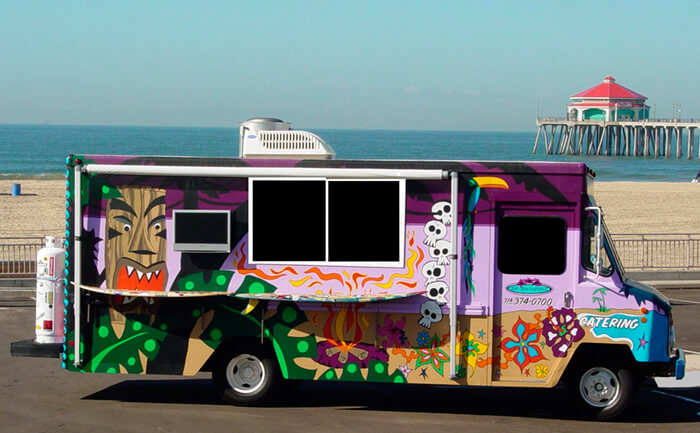
Building Your Brand Identity
Your brand is more than just a logo; it’s the entire experience you offer your customers. A strong brand identity can set you apart from competitors and build customer loyalty.
Key Branding Elements:
- Logo: A memorable logo that represents your cuisine and theme.
- Truck Design: The exterior of your truck should be visually appealing and reflective of your brand.
- Customer Interaction: The way you engage with customers through social media, promotions, and in-person interactions.
Leveraging Online Marketing
In today’s digital age, a strong online presence is essential for any food truck business. Use social media and a dedicated website to build your brand and attract customers.
Tips for Online Marketing:
- Social Media: Platforms like Instagram, Facebook, and Twitter are ideal for sharing updates, menu changes, and promotions. Engage with your audience by responding to comments and messages.
- Website: Create a simple website that includes your menu, location schedule, and contact information. Use SEO strategies to improve your site.
Additional Tips to Build a Profitable Food Truck Business
1. Focus on Location
The success of your food truck often depends on where you park. High-traffic areas such as business districts, events, and festivals can significantly boost your sales. Research popular food truck spots in your city and consider rotating locations to reach different customer segments.
2. Optimize Your Menu
Keep your menu focused and efficient. A smaller, well-curated menu allows you to maintain high-quality standards and reduce waste. Regularly update your menu based on customer feedback and seasonal ingredients to keep it fresh and appealing.
3. Engage with Your Customers
Customer service is key in the food truck industry. Engage with your customers both online and in person. Create a loyal customer base by offering excellent service, loyalty programs, and personalized experiences.
4. Monitor Your Finances
Keep a close eye on your expenses and revenue. Use accounting software to track your financials and identify areas where you can cut costs or increase profits. Regularly review your pricing strategy to ensure it remains competitive and profitable.
5. Stay Compliant
Food truck regulations can change, so it’s essential to stay informed about local laws and industry standards. Regularly inspect your truck and equipment to ensure they meet health and safety regulations.
6. Adapt to Trends
The food industry is constantly evolving, and so should your business. Stay updated on food trends and customer preferences, and be willing to adapt your menu, branding, or marketing strategies to stay relevant in the market.
By following these tips and continuously refining your approach, you can build a successful and profitable food truck business that delights customers and stands out in a competitive market.
Conclusion
You need a solid business strategy, good planning, and a thorough understanding of the market to own a food truck. Each step plays a crucial role in your success, from choosing the right truck to obtaining permits. The detailed guide above will help you build a profitable and sustainable food truck business.
Dunes Trailers is always here to assist you in every aspect of your food truck business, from design and licensing to maintenance and expert guidance. Our goal is to help make your food truck venture profitable and successful with our comprehensive support and expertise.
How much does it cost to start a food truck?
The cost to start a food truck can range from $50,000 to $200,000 depending on factors like the type of truck, equipment, permits, and initial inventory. Leasing a truck can reduce upfront costs.
What permits do I need to operate a food truck?
Permits vary by location but typically include a health permit, business license, fire safety permit, and parking permits. It’s essential to check local regulations to ensure compliance.
How do I create a profitable menu for my food truck?
Focus on signature dishes that can be prepared quickly and efficiently in a mobile kitchen. Consider ingredient costs, preparation time, and pricing to ensure a healthy profit margin.
What are the best ways to market my food truck?
Utilize social media platforms like Instagram and Facebook to engage with customers, post your location schedule, and promote special offers. A well-designed website and strong branding are also crucial for attracting and retaining customers.
